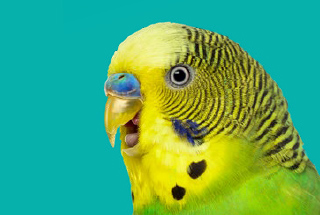Your bird’s welfare needs
 The five key welfare needs are:
The five key welfare needs are:
- Environment – the need for a suitable environment and place to live.
- Diet – the need for a suitable diet.
- Behaviour – the need to express normal behaviour.
- Companionship – the need to consider your pet’s social needs.
- The need to be protected from pain, suffering, injury and disease.
Welfare worries for birds
- Small cages – 32% of indoor birds are in cages that don’t allow enough movement.
- No company – 59% of birds live lonely lives, without the companionship of another bird.
- Wrong diet – 63% of owners feed birds seed mixes that lead to obesity.
- Boredom – 20% of owners don’t provide toys or other objects for their birds to play with.
- Exercise – 56% of owners don’t provide indoor birds with free flight time outside the cage.
- Lack of health care – 48% per cent of birds are not treated for intestinal worms and 44% are not treated for external parasites.
Top tips for bird owners
- Upgrade to the biggest indoor cage or outdoor aviary you can afford. Remember that birds prefer cages that are wide rather than tall and narrow (birds don't fly like helicopters).
- Consider a companion of the same or similar species for your bird and learn how to safely introduce a new bird. If you must have a solitary bird, try providing it with access to a mirror (birds, such as budgies think their reflection is another bird).
- Feed your bird commercially prepared bird pellets, plus fresh vegetables daily. Avoid feeding your bird seed mixes everyday as they can be quite fatty. Feed seeds in a small quantity for treats only.
- Birds, especially parrots, are really smart! Prevent boredom by providing birds with toys and rotate them regularly. Buy from pet shops or make your own from common household items, such as fresh cut (non-poisonous) branches, paper towel rolls or paper to shred.
- Give your indoor bird supervised sessions flying free out of the cage. Bird proof your home first to ensure it’s a safe and enjoyable experience.
- Treat your bird for both internal and external parasites. Parasite controls differ between species, housing systems, number of birds and exposure to new or wild birds. Your vet will be able to assist you to choose the right treatment.
Doing just one of these things today will make a big difference to your bird's life.
Bennett, P.C., Mornement, K., & Howell, T. (2013). Pet-care practices in Victoria, 2013: a survey of bird, cat, dog and rabbit owners. Unpublished report, La Trobe University, Australia.
Page last updated: 24 Nov 2025